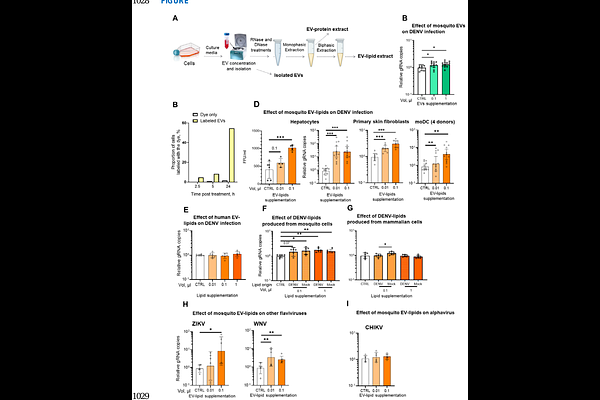Sphingomyelins in mosquito saliva modify the host lipidome to enhance transmission of flaviviruses by promoting viral protein levels

Sphingomyelins in mosquito saliva modify the host lipidome to enhance transmission of flaviviruses by promoting viral protein levels
Medkour, H.; Pruvost, L.; Gong, X.; Vaissayre, V.; Boutinaud, P.; Revel, J.; Hitakarun, A.; Sornjai, W.; Zoladek, J.; Smith, D. R.; Nisole, S.; Nolte-t Hoen, E.; bertrand-Michel, J.; Misse, D.; Marti, G.; Pompon, J.
AbstractMosquito saliva plays a determining role in flavivirus transmission. Here, we discover and elucidate how salivary lipids enhance transmission. Building upon our discovery of salivary extracellular vesicles (EV), we determined that lipids within mosquito EVs, and neither within human EVs nor virions, enhance infection for flaviviruses in primary cell types relevant for transmission. Mechanistically, mosquito EV-lipids specifically promote viral protein levels by reducing ER-associated degradation. Infection enhancement is caused by sphingomyelins within mosquito salivary EVs that elevate sphingomyelin concentration within host cells. Transmission assays showed that mosquito EV-lipids exacerbate disease severity. Our study reveals that EV-associated sphingomyelins within mosquito saliva enhance transmission for multiple flaviviruses by reconfiguring the host lipidome to promote viral protein levels and the resulting skin infection. Our findings open a new dimension centered on lipids in the interplay between hosts, mosquitoes and flaviviruses that determine transmission, unveiling lipids as a new pan-flavivirus target.